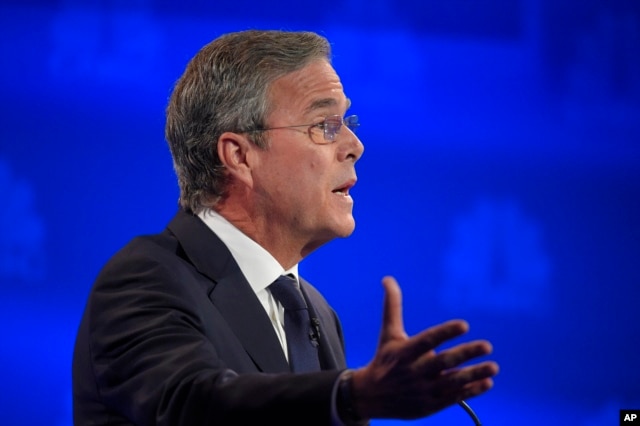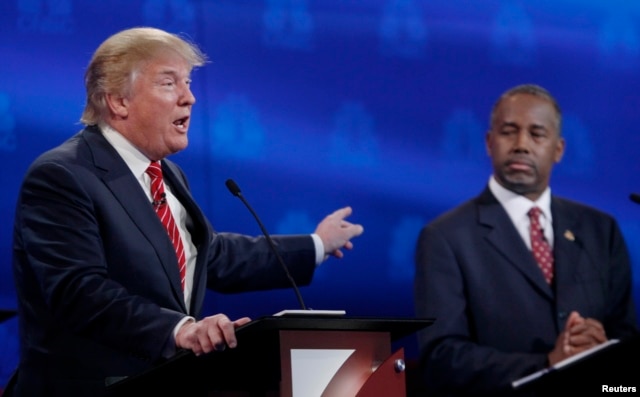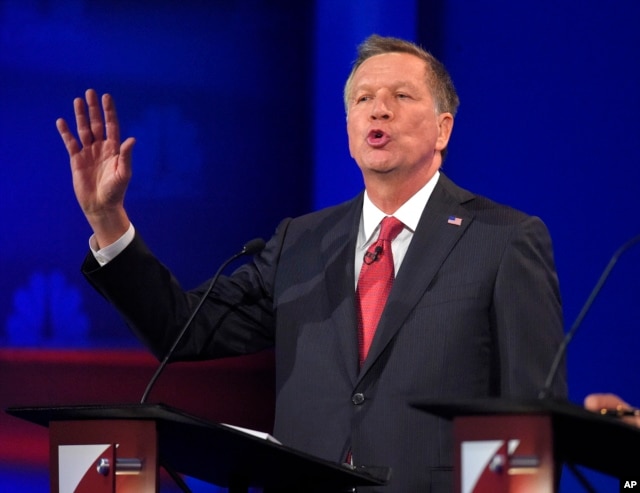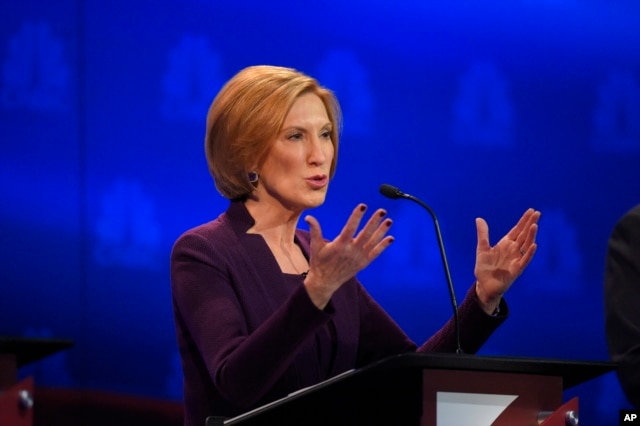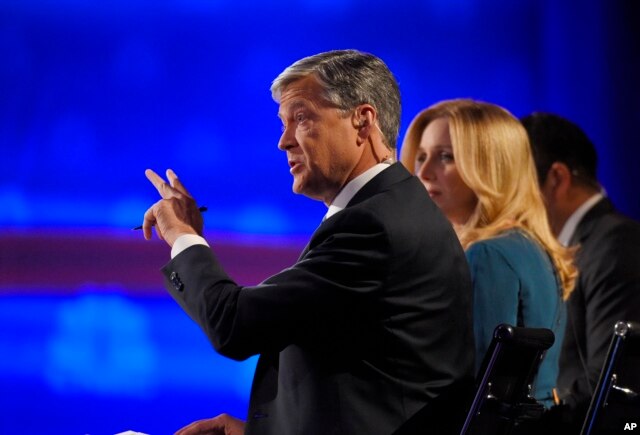
Rubio Scores Points, Trump Struggles at GOP Debate
William Gallo
Marco Rubio came out on the winning end of a testy exchange with his longtime friend Jeb Bush and had an overall solid performance, according to many analysts, after the third Republican presidential debate of the primary season Wednesday.
Rubio, the fresh-faced Florida senator, and Bush, the former governor of the same state, were among 10 presidential hopefuls that sparred, mostly over economic policy, at the debate in Boulder, Colorado.
Bush, who was once seen as a favorite of the Republican establishment but whose campaign has struggled to gain traction, attacked Rubio early in the debate for missing what he said were too many votes in the Senate.
Jeb Bush speaks during the CNBC Republican presidential debate at the University of Colorado, Oct. 28, 2015, in Boulder, Colo.
«Marco, when you signed up for this, this was a six-year term,» said Bush. «And you should be showing up to work. I mean, literally, the Senate, what is it, like a French work week, where you get like three days where you have to show up?»
Rubio shot back quickly, accusing Bush of attacking him out of political expediency: «Someone has convinced you that attacking me is going to help you,» Rubio said to the man who in the past served as his mentor.
Trump on defensive
The debate, broadcast on financial cable news channel CNBC, comes as real estate mogul Donald Trump appears to be losing his monthslong grip on the race’s front-runner position.
Trump, the outspoken reality television star who now trails retired neurosurgeon Ben Carson in several national polls, appeared more subdued and on the defensive, compared to previous debates.
Early on, Trump reacted angrily when a moderator asked whether his tax plans, which some say would cause deficits, and his proposal to build a border wall to keep out Mexican immigrants meant he was running a «comic book» presidential campaign.
U.S. presidential candidate and businessman Donald Trump, left, speaks as Ben Carson, a retired neurosurgeon, listens at the 2016 U.S. Republican presidential candidates debate held by CNBC in Boulder, Colo., Oct. 28, 2015.
«That’s not a very nicely asked question the way you said that,» said Trump. He went on to defend his tax proposal, saying it would ensure the U.S. economy «would take off like a rocket ship.»
Carson defends tax plan
Carson, the soft-spoken political outsider, also fielded several attacks from rivals, including on his own tax plan, which he has said is inspired by the biblical concept of tithing.
«I didn’t say the rate would be 10 percent. I used a tithing analogy. … The rate would be much closer to 15 percent,» said Carson, an evangelical Christian. «You also have to get rid of all the deductions and loopholes.»
Ohio Governor John Kasich used the opportunity to pounce on both front-runners. He slammed Carson’s and Trump’s tax proposals as «fantasy» and saying they were evidence the candidates are unqualified to become president.
«Folks, we’ve got to wake up,» Kasich said. «We cannot elect somebody that doesn’t know how to do the job. You have got to pick somebody who has experience, somebody that has the know-how, the discipline.»
John Kasich makes a point during the CNBC Republican presidential debate at the University of Colorado, Oct. 28, 2015.
Also at the debate were former Hewlett Packard executive Carly Fiorina, New Jersey Governor Chris Christie, former Arkansas Governor Mike Huckabee, Texas Senator Ted Cruz and Kentucky Senator Rand Paul.
Crowded stage
The crowded stage made it more difficult to project a clear winner or loser, and also prevented in-depth discussion on issues, according to Northeastern University journalism professor Alan Schroeder.
«I thought it was sort of a big, sprawling debate, almost a little too sprawling. One of the things that happens with primary debates over the course of a cycle is that each time you watch there are one or two people gone from the previous time.»
«I think the fact that we keep having these enormous debates with this huge casts of characters – it makes it very difficult to focus on anything,» Schroeder told VOA.
But Schroeder, the author of a book on U.S. presidential debate history, said Rubio was among those who shone brightest, particularly noting the back-and-forth with Bush.
«Rubio has an ability to really deflect incoming attacks on him, and Jeb Bush just seems to be really ham-handed when it comes to going after people,» Schroeder said.
From left, U.S. presidential candidates Senator Ted Cruz, Governor Chris Christie and Representative Rand Paul participate in the 2016 Republican presidential candidates debate held by CNBC in Boulder, Colo., Oct. 28, 2015.
Richard Temple, a California-based Republican strategist, agrees, saying Rubio could see a jump in the polls following the debate.
«Rubio’s been strong in every debate, but he’s now gaining traction as a more pragmatic Republican choice for those who decide they don’t want to vote for Donald Trump or Ben Carson,» Temple told VOA.
Trump stumbles
It was not the best night for Trump, who repeated some of the same talking points – almost verbatim – as in past debates. His performance, combined with his lagging poll numbers, suggest his downfall may have begun, according to Temple.
Carly Fiorina speaks during the CNBC Republican presidential debate at the University of Colorado, Oct. 28, 2015, in Boulder, Colo.
«Many people were thinking that Donald Trump wasn’t going to follow the rules of gravity,» said Temple. «I think that is starting now. He doesn’t have a depth that some of the other candidates who have held office.»
«His basically ‘one-note-Johnny’ message ultimately will start to weigh him down. I think he’s starting a slow erosion of his support, and voters will find somewhere else to go to.»
Attacks on media
Another potential loser in the debate was the media – specifically the CNBC moderators, who tried and failed several times to get the candidates to attack each other personally.
«I think everyone saw attacking the press to be a smart strategy. I’m not sure if it is, I think it’s kind of gratuitous. But it got the most applause,» said Republican pundit John Feehery.
Debate moderators moderator John Harwood, left, moderator Becky Quick, center, and moderator Carl Quintanilla appear during the CNBC Republican presidential debate at the University of Colorado, Wednesday, Oct. 28, 2015.
Undercard debate
The main event followed an earlier «undercard» debate during which the lower-ranking candidates battled for attention.
Longtime Senator Lindsey Graham used the stage to attack Trump and his «Make America Great Again» slogan. «America is great,» he said. «I intend to make America strong again.»
Also participating in the warmup debate were former Senator Rick Santorum, Louisiana Governor Bobby Jindal, and former New York Governor George Pataki, all of whom have barely registered any support in national polls.
Republican presidential candidates, from left, Bobby Jindal, Rick Santorum, George Pataki, and Lindsey Graham take the stage during the CNBC Republican presidential debate at the University of Colorado, in Boulder, Colo., Oct. 28, 2015.


